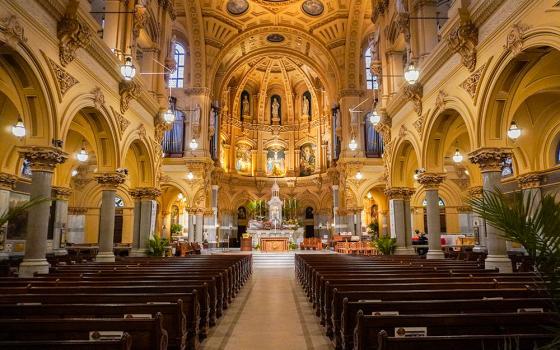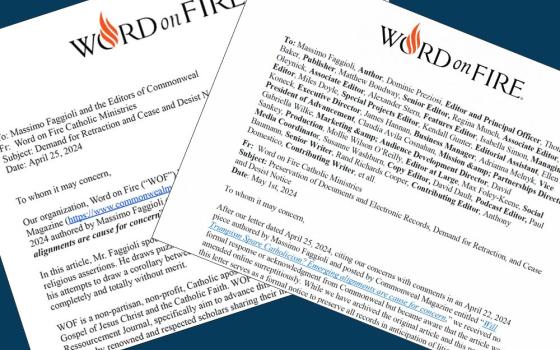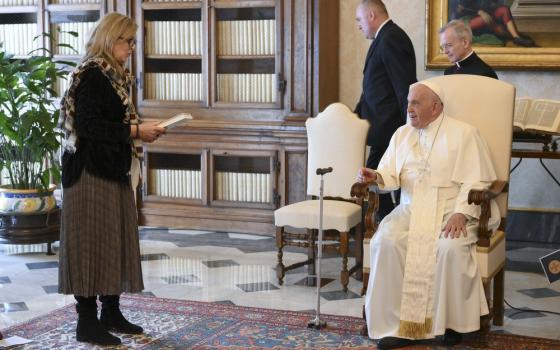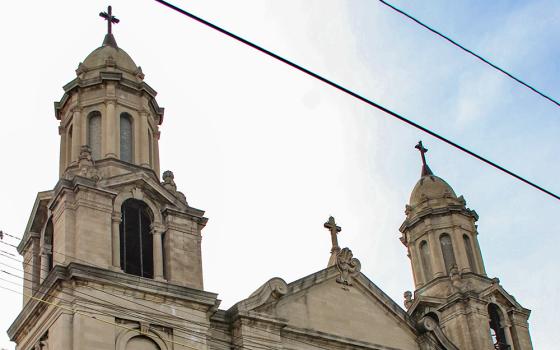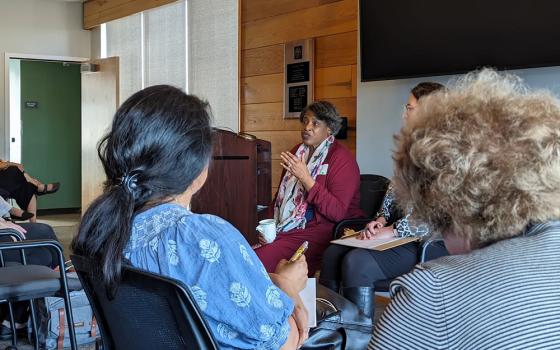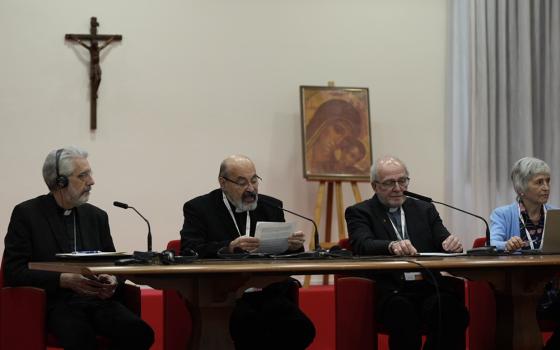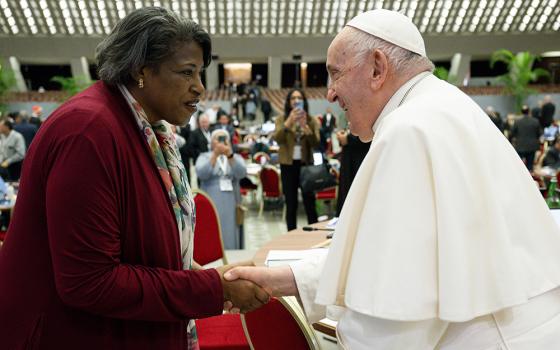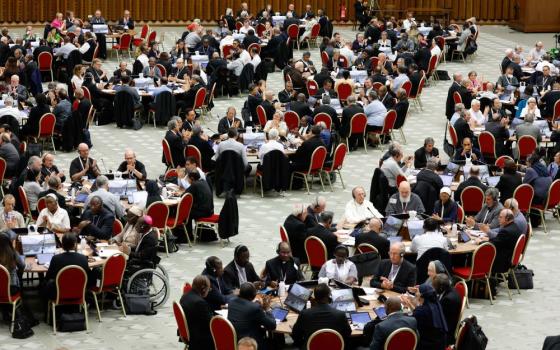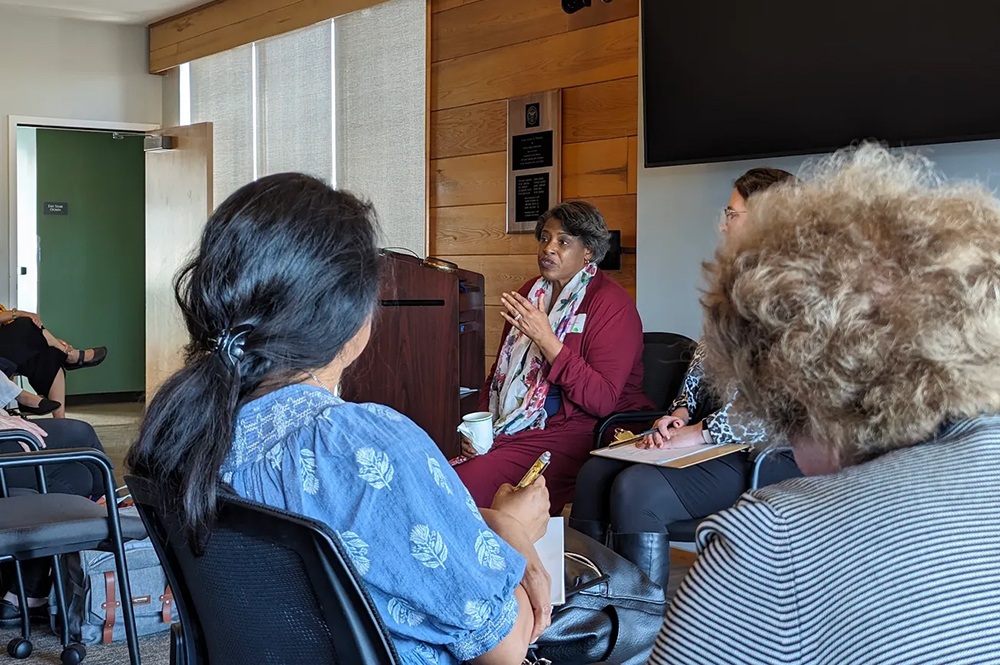
Cynthia Bailey Manns addresses attendees at the "Women & Synodality: Where Do We Go From Here?" event on May 4, 2024, at the Jesuit School of Theology of Santa Clara University in Berkeley. (Black Catholic Messenger/Nate Tinner-Williams)
"Mary of Nazareth, who heard the call of God and answered her Yes!"
These words graced a prayer service on the first day of a gathering of Catholics and allies at "Women & Synodality: Where Do We Go From Here?", held at the Jesuit School of Theology of Santa Clara University from May 3-4.
It included more than a hundred attendees, including two of the American women who are voting delegates to the Synod on Synodality, now in the second part of its Rome phase. Ahead of the synod's next meeting, scheduled for October in Italy, the two delegates and others advocating for "listening church" spoke in the Bay Area on their experiences as ministers, educators, administrators, and — at times — victims of misogyny and clericalism.
The two-day gathering also included synodal dialogues of its own, with attendees situated for roundtable discussions like those that took place with global implications last fall at the Vatican. Themes of hope, longing, and empowerment emerged in Berkeley, with women from various backgrounds speaking boldly on the state of their community in the church.
Advertisement
Virtually all of the African Americans present were facilitators in one way or another, including Cynthia Bailey Manns, one of two African American delegates to the synod; Nancy Pope-Angulo, a liturgical minister at St. Columba Catholic Church in Oakland, and Yolanda Brown, an anti-racism advocate in Southern California.
The quote from the prayer service could be interpreted in various ways, perhaps evocative of the divine feminine or perhaps more anodyne. In this way, it is similar to the synod itself. The three-year process has been met with anticipation, joy, and welcome from supporters of Pope Francis who believe his forward-facing outlook bodes well for the church. It has also faced questions, trepidation, and opposition from Catholics who feel the authority of the church and its teaching is at stake.
Manns, who helped lead a panel with fellow U.S. delegate Julia Osęka, said her experience of the synod has been one of deep appreciation.
"One of the challenges, and probably an overarching one, was just not knowing how we [as women] would be received. … You know, if you're sitting in a table and you're the only woman there, does that mean you're going to be listened to or that you're not going to be listened to?" she told Black Catholic Messenger, adding that any apprehension faded as the October session went on — following her positive experience with the continental phase, in which she dialogued with delegates from across North America.
She attributed this largely to the ethos of the synod, which, in her words, champions the "Holy Spirit as protagonist." The synod model, based on the concept of "conversations in the Spirit," features a prominent place for silence and prayer, not merely the sharing of ideas and deliberation. Debate is also not a major feature, with delegates, from cardinals to college students, instead sharing their thoughts — without interruption — before points of agreement and disagreement are used to form working documents.
Other speakers at the gathering in Berkeley noted how, in their functions at various levels of the church, being a woman is often an invitation for marginalization by powerful male figures unaccustomed (and hostile) to female input, authority, and decision-making.
Manns, who serves at a progressive parish in Minnesota where women's leadership is common and encouraged, says the synod model all but ruled out male dominance at the expense of female voices.
"The conversation in the Spirit really does not allow for that," said Manns, noting a particular instance in Rome that caught her attention. "There was a point when a woman was speaking and she wasn't done and she was interrupted by someone, and the facilitator reminded them that she was still talking."
"I think that was the main overarching thing for me: that yes, I was a voting delegate, but that it was really going to really happen. … What I had to say was just as important as everybody else's in my group. That is part of the process."
The theme of participation — and in particular, lay preaching — was a repeated topic at the Berkeley event, with women having long advocated for the ability to minister at the pulpit in Catholic churches. It is currently disallowed by the church hierarchy.
However, in a room full of Catholic women sharing their testimonies and struggle to be seen, heard, and valued in the church, there was no absence of sacred proclamation. Manns said a similar energy was at work in Rome in the fall, especially with the encouragement of the synod retreat leader, the English Dominican friar Timothy Radcliffe.
"There was a wonderful presentation he did on spiritual authority and he reminded everybody that you have that. And not only do you have it, it's your responsibility to act from that space," said Manns.
"That is a reminder for me and I usually stay in that space. I'm not usually one to be intimidated. … It was a reminder for me to really take advantage of the synod and to be in that space as much as I could."
"It's not only about the topics. It's about the whole ministry of synodality, and how to use that and be a part of that within your communities."
— Cynthia Bailey Manns
Manns says she takes the concerns of many groups with her — as well as the spiritual authority of Servant of God Thea Bowman — as she returns to the synod this fall for a final meeting of the delegates. The concerns include those of women, Black Americans, LGBTQ+ people, and others. Many of them featured prominently in the document the delegates produced last year from their conversations.
Manns, who recalled the long hours the group spent reviewing the document line-by-line, says she hopes the upcoming Instrumentum Laboris that will guide this October's discussions will repeat and improve upon those focus points. The new document is due for release in the summer from the Vatican's synod office.
In the meantime, Manns is planning synodal listening sessions with communities stateside (including Black Catholics), much like the Berkeley event, whose participants submitted comments that will be sent to the Vatican.
"I'll be doing listing sessions once the [Instrumentum Laboris] drops, on topics just like I did before. And as I've always thought, particularly since I've been back, it's not only about the topics. It's about the whole ministry of synodality, and how to use that and be a part of that within your communities," she said.
"It's not a program. It's a way of being church. That's something we have to wrap our heads and hearts around."
